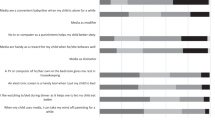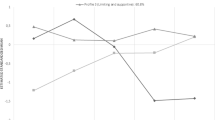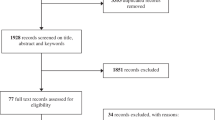Abstract
The increasing use of social media has changed communication habits among parents and provides the opportunity to access social support online. This paper explored parents’ use of different social media sources and examined potential factors that motivate parents’ use of social media for parenting support. A total of 523 parents completed the Australia-wide online survey. Results indicated that parents endorsed Facebook, parenting websites and blogs as the most frequently used social media sources. Getting specific information and advice were the top ranked reasons parents accessed social media for parenting purposes. A series of multiple regression analyses were conducted to investigate predictors of social media use (Model 1) and parents’ perceived level of online social support (Model 2). Analyses of Model 1 revealed that after controlling for demographic variables, parents’ social media use was predicted by internet self-efficacy, perceptions towards the social media and online support. Analyses of Model 2 revealed that after controlling for demographic variables, parents’ perceptions toward social media, and their use of social media predicted levels of online social support, such that the more parents used social media, the greater the online support they reported receiving. Child maladjustment and parenting self-efficacy did not predict either social media use or online social support. The results indicate that parents do use social media for parenting purposes, and that it can serve as a type of social support.


Similar content being viewed by others
References
Australian Communications and Media Authority (2015). Communications report 2013-14 series: Report 1- Australians’ digital lives. Canberra, ACT.
Baker, S., Sanders, M. R., & Morawska, A. (2017). Who uses online parenting support? A cross-sectional survey exploring Australian parents’ internet use for parenting. Journal of Child and Family Studies, 26(3), 916–927. doi:10.1007/s10826-016-0608-1.
Baum, L. S. (2004). Internet parent support groups for primary caregivers of a child with special health care needs. Pediatric Nursing, 30(5), 381 http://search.proquest.com.ezproxy.library.uq.edu.au/docview/199397618.
Bolton, A. J., & Dorstyn, D. S. (2015). Telepsychology for posttraumatic stress disorder: A systematic review. Journal of Telemedicine and Telecare, 21(5), 254–267. doi:10.1177/1357633X15571996.
Charova, E., Dorstyn, D., Tully, P., & Mittag, O. (2015). Web-based interventions for comorbid depression and chronic illness: A systematic review. Journal of Telemedicine and Telecare, 21(4), 189–201. doi:10.1177/1357633X15571997.
Cummings, J. N., Sproull, L., & Kiesler, S. B. (2002). Beyond hearing: Where real-world and online support meet. Group Dynamics: Theory, Research, and Practice, 6(1), 78–88. doi:10.1037/1089-2699.6.1.78.
Dahlem, N. W., Zimet, G. D., & Walker, R. R. (1991). The multidimensional scale of perceived social support: A confirmation study. Journal of Clinical Psychology, 47(6), 756–761. doi:10.1002/1097-4679(199111)47:6<756::AID-JCLP2270470605>3.0.CO;2-L.
Enebrink, P., Hogstrom, J., Forster, M., & Ghaderi, A. (2012). Internet-based parent management training: A randomized controlled study. Behaviour Research and Therapy, 50(4), 240–249. doi:10.1016/j.brat.2012.01.006.
Feil, E. G., Baggett, K. M., Davis, B., Sheeber, L., Landry, S., Carta, J. J., & Buzhardt, J. (2008). Expanding the reach of preventive interventions: Development of an internet-based training for parents of infants. Child Maltreatment, 13(4), 334–346. doi:10.1177/1077559508322446.
Finn, J., & Kerman, B. (2005). The use of online social support by foster families. Journal of Family Social Work, 8(4), 67–85. doi:10.1300/J039v08n04_04.
Gundersen, T. (2011). ‘One wants to know what a chromosome is’: The internet as a coping resource when adjusting to life parenting a child with a rare genetic disorder. Sociology of Health & Illness, 33(1), 81–95. doi:10.1111/j.1467-9566.2010.01277.x.
Haslam, D. M., Pakenham, K. I., & Smith, A. (2006). Social support and postpartum depressive symptomatology: The mediating role of maternal self‐efficacy. Infant Mental Health Journal, 27(3), 276–291. doi:10.1002/imhj.20092.
Haslam, D. M., Sanders, M. R., & Sofronoff, K. (2013). Reducing work and family conflict in teachers: A randomised controlled trial of Workplace Triple P. School Mental Health, 5(2), 70–82. doi:10.1007/s12310-012-9091-z.
Ingersoll, B., Wainer, A. L., Berger, N. I., Pickard, K. E., & Bonter, N. (2016). Comparison of a self-directed and therapist-assisted telehealth parent-mediated intervention for children with ASD: A pilot RCT. Journal of Autism and Developmental Disorders, 1–10. doi:10.1007/s10803-016-2755-z.
Jackson, A. P. (2000). Maternal self-efficacy and children’s influence on stress and parenting among single black mothers in poverty. Journal of Family Issues, 21(1), 3–16. doi:10.1177/019251300021001001.
Jang, J., & Dworkin, J. (2014). Does sociel network site use matter for mothers? Implications for bonding and bridging capital. Computers in Human Behaviour, 35, 489–495.
Jones, S., Wainwright, L. D., Jovanoska, J., Vincent, H., Diggle, P. J., Calam, R., & Lobban, F. (2015). An exploratory randomised controlled trial of a web-based integrated bipolar parenting intervention (IBPI) for bipolar parents of young children (aged 3–10). BMC Psychiatry, 15, 122 doi:10.1186/s12888-015-0505-y.
Kingsnorth, S., Gall, C., Beayni, S., & Rigby, P. (2011). Parents as transition experts? Qualitative findings from a pilot parent-led peer support group. Child: Care, Health and Development, 37(6), 833–840. doi:10.1111/j.1365-2214.2011.01294.x.
Lee, M. M., & Sullivan-Bolyai, S. (2011). Parent mentor perspectives on providing social support to empower parents. The Diabetes Educator, 37(1), 35–43. doi:10.1177/0145721710392248.
Lewis, R. M., Petch, V., Wilson, N., Fox, S., & Craig, C. E. (2015). Understanding conduct disorder: The ways in which mothers attempt to make sense of their children’s behaviour. Clinical Child Psychology and Psychiatry, 20(4), 570–584. doi:10.1177/1359104514538040.
Love, S. M., Sanders, M. R., Turner, K. M. T., Maurange, M., Knott, T., Prinz, R., & Ainsworth, A. T. (2016). Social media and gamification: Engaging vulnerable parents in an online evidence-based parenting program. Child Abuse & Neglect. doi:10.1016/j.chiabu.2015.10.031.
Mackinnon, A., Griffiths, K. M., & Christensen, H. (2008). Comparative randomised trial of online cognitive-behavioural therapy and an information website for depression: 12-month outcomes. The British Journal of Psychiatry, 192(2), 130–134. doi:10.1192/bjp.bp.106.032078.
Metzler, C. W., Sanders, M. R., Rusby, J. C., & Crowley, R. N. (2012). Using consumer preference information to increase the reach and impact of media-based parenting interventions in a public health approach to parenting support. Behavior Therapy, 43(2), 257–270. doi:10.1016/j.beth.2011.05.004.
Morawska, A., Sanders, M. R., Haslam, D. M., Filus, A., & Fletcher, R. (2014). Child adjustment and parent efficacy scale: Development and initial validation of a parent report measure. Australian Psychologist, 49(4), 241–252. doi:10.1111/ap.12057.
Nieuwboer, C. C., Fukkink, R. G., & Hermanns, J. M. (2013). Online programs as tools to improve parenting: A meta-analytic review. Children and Youth Services Review, 35(11), 1823–1829. doi:10.1016/J.Childyouth.2013.08.008.
O’Connor, H., & Madge, C. (2004). ‘My mum’s thirty years out of date’. Community, Work & Family, 7(3), 351–369. doi:10.1080/1366880042000295754.
O’Keeffe, G. S., & Clarke-Pearson, K. (2011). The impact of social media on children, adolescents, and families. Pediatrics, 127, 800–804. doi:10.1542/peds.2011-0054.
Ortega, D. M. (2002). How much support is too much? Parenting efficacy and social support. Children and Youth Services Review, 24(11), 853–876. doi:10.1016/S0190-7409(02)00239-6.
Reger, M. A., & Gahm, G. A. (2009). A meta-analysis of the effects of internet- and computer-based cognitive-behavioral treatments for anxiety. Journal of Clinical Psychology, 65(1), 53–75. doi:10.1002/jclp.20536.
Rothbaum, F., Martland, N., & Jannsen, J. B. (2008). Parents’ reliance on the web to find information about children and families: Socio-economic differences in use, skills and satisfaction. Journal of Applied Developmental Psychology, 29(2), 118–128. doi:10.1016/j.appdev.2007.12.002.
Sanders, M. R., Baker, S., & Turner, K. M. T. (2012). A randomized controlled trial evaluating the efficacy of Triple P Online with parents of children with early-onset conduct problems. Behaviour Research and Therapy, 50(11), 675–684. doi:10.1016/j.brat.2012.07.004.
Sanders, M. R., Haslam, D. M., Calam, R., Southwell, C., & Stallman, H. M. (2011). Designing effective interventions for working parents: A web‐based survey of parents in the UK workforce. Journal of Children’s Services, 6(3), 186–200. doi:10.1108/17466661111176042.
Sanders, M. R., Markie-Dadds, C., & Turner, K. M. T. (1999). Practitioner’s manual for primary care triple P. Milton, Qld: Triple P International.
Schlegl, S., Burger, C., Schmidt, L., Herbst, N., & Voderholzer, U. (2015). The potential of technology-based psychological interventions for anorexia and bulimia nervosa: A systematic review and recommendations for future research. Journal of Medical Internet Research, 17(3), e85 doi:10.2196/jmir.3554.
Sensis. (2016). Yellow Social Media Report: How Australian people and businesses are using social media. Retrieved from Sensis Website Retrieved https://www.sensis.com.au/asset/PDFdirectory/Sensis_Social_Media_Report_2016.PDF.
Suzuki, S., Holloway, S. D., Mindnich, J. D., & Yamamoto, Y. (2009). Parenting self-efficacy and social support in Japan and the United States. Journal of Family Issues, 30(11), 1505–1526. doi:10.1177/0192513x09336830.
Turner, J. W., Grube, J. A., & Meyers, J. (2001). Developing an optimal match within online communities: An exploration of CMC support communities and traditional support. Journal of Communication, 51(2), 231–251. doi:10.1093/joc/51.2.231.
Wade, S. L., Carey, J., & Wolfe, C. R. (2006). The efficacy of an online cognitive-behavioral family intervention in improving child behavior and social competence following pediatric brain injury. Rehabilitation Psychology, 51(3), 179–189. doi:10.1037/0090-5550.51.3.179.
Young, K. T., Davis, K., Schoen, C., & Parker, S. (1998). Listening to parents: A national survey of parents with young children. Archives of Pediatrics & Adolescent Medicine, 152(3), 255–262. doi:10.1001/archpedi.152.3.255.
Zwaanswijk, M., Verhaak, P. F. M., Bensing, J. M., van der Ende, J., & Verhulst, F. C. (2003). Help seeking for emotional and behavioural problems in children and adolescents: A review of recent literature. European child & Adolescent Psychiatry, 12(4), 153–161. doi:10.1007/s00787-003-0322-6.
Author information
Authors and Affiliations
Corresponding author
Ethics declarations
Conflict of Interest
The Parenting and Family Support Centre is partly funded by royalties stemming from published resources of the Triple P—Positive Parenting Program, which is developed and owned by The University of Queensland (UQ). Royalties are also distributed to the Faculty of Health and Behavioural Sciences at UQ and contributory authors of published Triple P resources. Triple P International (TPI) Pty Ltd is a private company licensed by Uniquest Pty Ltd on behalf of UQ, to publish and disseminate Triple P worldwide. The authors of this report have no share or ownership of TPI. Dr Haslam may in future receive royalties and/or consultancy fees from TPI. TPI had no involvement in the study design, collection, analysis or interpretation of data, or writing of this report. Dr Haslam and Dr Baker are employees at UQ. Author Tee is a student at UQ.
Rights and permissions
About this article
Cite this article
Haslam, D.M., Tee, A. & Baker, S. The Use of Social Media as a Mechanism of Social Support in Parents. J Child Fam Stud 26, 2026–2037 (2017). https://doi.org/10.1007/s10826-017-0716-6
Published:
Issue Date:
DOI: https://doi.org/10.1007/s10826-017-0716-6




